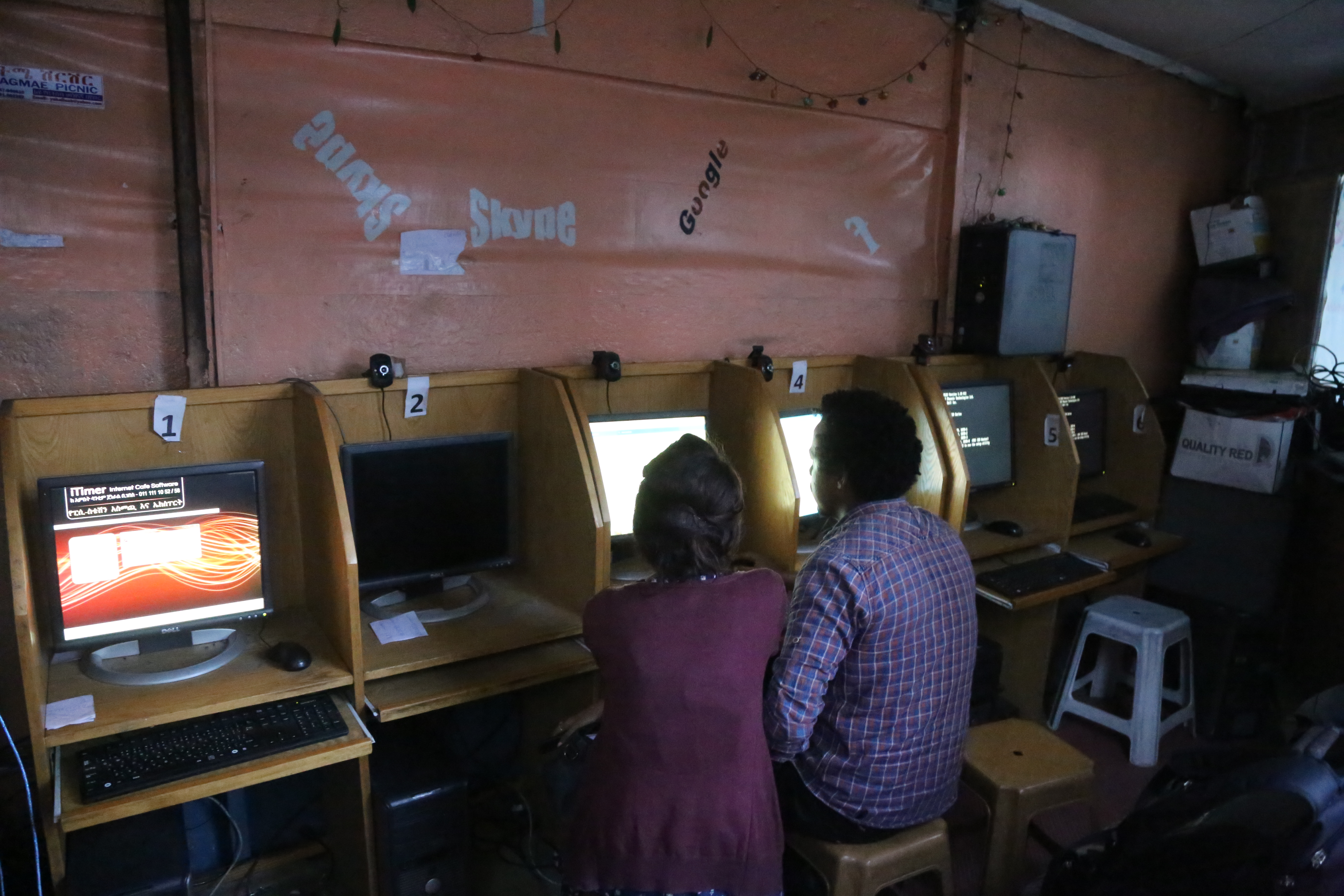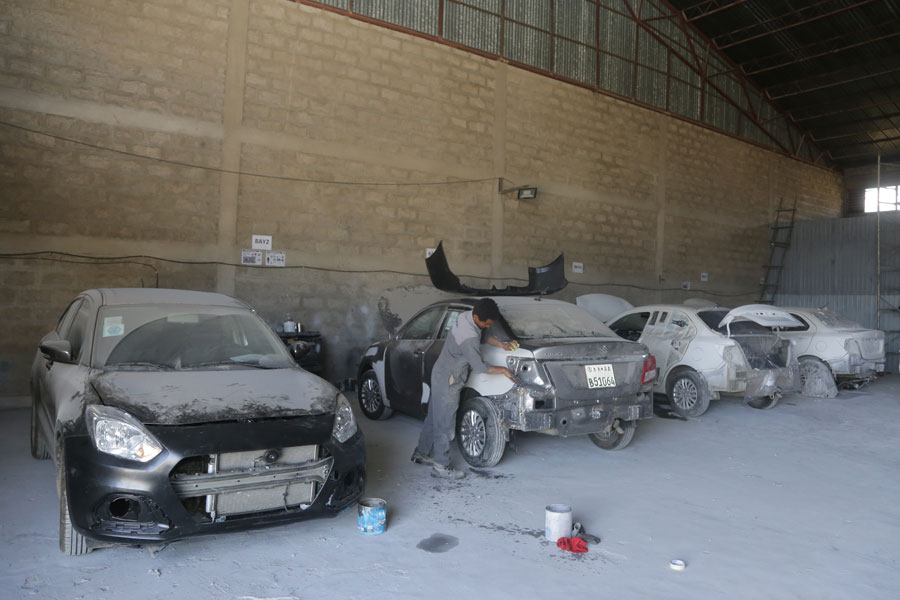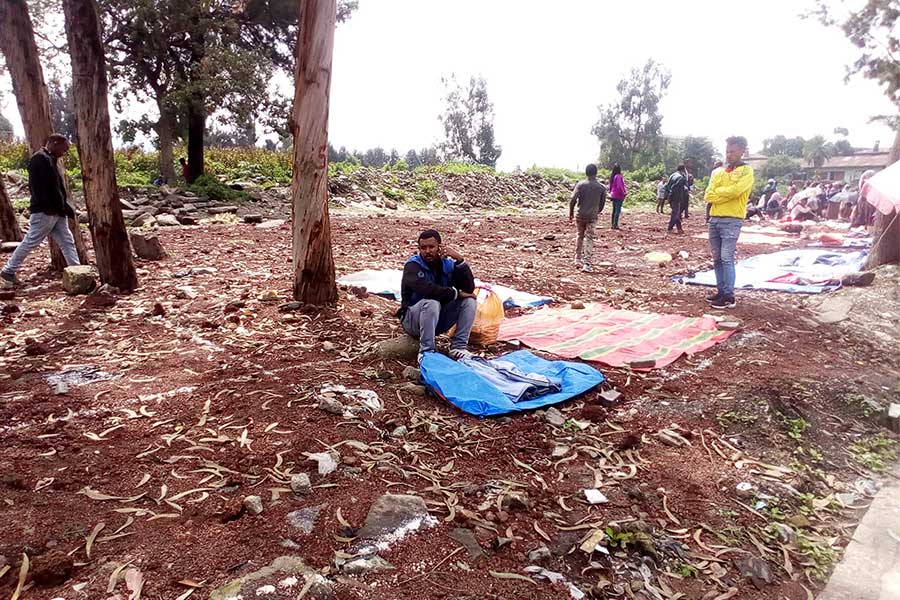
The streets of Piassa in Arada District, the heart of old Addis Abeba, are known for their jewellery shops. One bedazzled gold shop window follows another down the road from Cinema Empire to the Greek church. There are over 20 of these shops selling precious gemstones, silver and gold, and their customer base comes with just as much variety.
"Some people come looking to buy gold they saw in a movie or a video clip," said one of the shopkeepers who wanted to remain anonymous. "You might not believe it, but wearing gold is like clothing for some groups of people. It is fashion."
The 24-year-old shopkeeper, who has been selling gold in her father's shop for the past seven years, has seen it all.
There are also those that walk in looking for engagement rings for their future fiancè.
"They guess their fiancè's ring size or sometimes use my size as a sample," she said. "But it's rare to find a man who comes to the shop to buy a neckless or bracelets."
The shop she keeps has been open for nearly three decades selling 18, 21, and the rarer 24-karat gold. But there are also those that come to sell their gold—cash-strapped parents in situations so difficult that selling what they have is the only solution to feed their children, according to her. The shop sources its gold from the National Bank of Ethiopia and imports special designs from Dubai.
Lately, the shop has seen an increase in a new type of customer—asset collectors. This odd trend began, interestingly enough, following the recent announcement of the new currency being issued by the government in mid-September.
The new notes aim to minimise the wide circulation of currency outside of banks, an estimated 113 billion Birr, according to a report by the Ethiopian Bankers Association. The demonetisation was intended to curb corruption and contraband and support financial institutions confronting the liquidity crisis.
During the banknote changeover process, which is ongoing, the central bank ordered that old notes redeemed for over 5,000 Br have to be effected through a bank account. Additionally, any kind of transactions over 50,000 Br in value should also be done through banks.
Beside the National Theater in Addis Abeba, parallel currency market brokers solicit passersby.
During the first three weeks of the changeover process, close to 600,000 new accounts have been opened and 14 billion Br was mobilised, according to a report from the central bank, which intends to institute the new bills completely over three years.
Still, people have started to look for alternate ways to keep money in their hands rather than taking the money into banks. Subsequently, the gold market is now being used as a way out, according to observers.
"The people who come here to buy gold as an asset buy very expensive white gold and 24-karat yellow gold," said the young shopkeeper. "Sometimes they get 21-karat gold with extra designs on them."
Before the onset of the Novel Coronavirus (COVID-19) pandemic in the country, the store had up to 15 customers that made purchases; this figure has now risen to 25 customers a day.
"We even have requests for gold delivery at customers' offices or houses," said the shopkeeper, who explained that they had made a special trip to Dubai to purchase gold as soon as travel restrictions were lifted.
A link in the gold buying and selling chain in the neighbourhood are brokers who solicit passersby as they make their way down the street. The brokers work on commission from the owners or ask for tips from the customers after they buy or sell.
One broker, born and raised in the same neighbourhood, also confirmed the rise in demand for gold following the currency change.
"We receive calls from different places for delivery nowadays," said the broker who has been working in this business for nearly a decade. "People don't want to move with that much cash."
Thus, the brokers take the risks and deliver to the customer's door. This is not an issue for most of the time since the customers are vouched for by the gold stores, according to him.
Another market that has seen a related rise is the parallel or black currency market.
The infamous arena for this market, located nearly four kilometres from Piassa, is commonly known as the neighbourhood surrounding Ethiopia Hotel. There, money is changed from foreign currencies to Birr at higher prices than at the banks, playing a significant role in money laundering, an economic activity that takes place outside government-sanctioned channels. Here, as in Piassa, a person will get accosted with requests to change money.
Though the price of buying and selling foreign currencies like the euro, dollar, and pound sterling fluctuates over time, the buying price of a dollar went up from 44 Br to 45 Br, while at official intermediaries it is just above 37 Br, according to a seller who requested anonymity.
"The number of people who are buying dollars has also increased compared to recent months," he said. The selling price of a dollar has also subsequently increased from 45 Br to 46 Br, according to the same source, who said exchanges amounting to 100,000 dollars will decrease this price to 45.5 Br.
Though police raided the area a few weeks ago and shut down all suspected stores located around Ethiopia Hotel, they were not able to seize much illegal currency, according to the seller.
The currency change will push people with illegal money to find alternate means, according to Abie Sano, a banker with a wide range of experience in the industry and president of Commercial Bank of Ethiopia and the Bankers Association.
"The government should take action against the black market," he said. "It'll be challenging, and the problem won’t be eliminated, but it's possible to minimise it."
The Bankers Association might propose reducing the three-month time span to change the old currency to new notes as one idea to combat this, according to the President.
"Though the dissemination of new notes was a problem in the beginning, it has now been solved," said Abie.
A total of 3.7 billion Br was spent by the government to print 2.9 billion notes of 100, 50, 10 and 200 Br denominations with a total value of 262 billion Br. People with over 100,000 Br cash on hand are mandated to go to banks and change out their notes within a month, while those with over 10,000 Br must open a bank account.
People tend to go to the black market either to gain that extra amount or change their illegal money to other foreign currencies, according to Atlaw Alemu (PhD), an instructor at Addis Abeba University's Department of Business & Economics.
The problem, he states, lies with the enforcement of the law.
"The government tends to have laws, policies and regulations," he said, "but if it is not implemented, then there is no need to have it in the first place. "If the government doesn’t get involved in controlling the black market or any other illegal activities, then the changeover of notes may not fulfill its intended objectives."
For other economists like Tsegaye GebreKidan (PhD), the parallel market is a sign that indicates an underlying problem.
"Raiding black market shops won't bring a permanent solution to the problem," he said. "The government should focus on the basic problems that push people to go to the market. One of the reasons is the shortage in supply of foreign currency to the private sector to import goods."
The country should maximise its exports to mitigate the problem of the foreign exchange shortage, he recommended.
"Additionally, the fair distribution of available foreign currency among private and government-owned companies should be ensured," he said. "Unless these root causes are addressed properly, the black market will continue and might endanger the demonetisation."
(BEMNET WONDWOSEN has contributed to this story)
PUBLISHED ON
Oct 10,2020 [ VOL
21 , NO
1067]

Sponsored Contents | Jun 17,2021

Radar | Sep 10,2021

Agenda | Nov 27,2018

Agenda | Jan 21,2023

Radar | Sep 28,2019

Jul 13 , 2024 . By AKSAH ITALO
Investors who rely on tractors, trucks, and field vehicles for commuting, transportin...

Jul 13 , 2024 . By MUNIR SHEMSU
The cracks in Ethiopia's higher education system were laid bare during a synthesis re...

Jul 13 , 2024 . By AKSAH ITALO
Construction authorities have unveiled a price adjustment implementation manual for s...

Jul 13 , 2024
The banking industry is experiencing a transformative period under the oversight of N...

Jul 20 , 2024
In a volatile economic environment, sudden policy reversals leave businesses reeling...

Jul 13 , 2024
Policymakers are walking a tightrope, struggling to generate growth and create millio...

Jul 7 , 2024
The federal budget has crossed a symbolic threshold, approaching the one trillion Bir...

Jun 29 , 2024
In a spirited bid for autonomy, the National Bank of Ethiopia (NBE), under its younge...